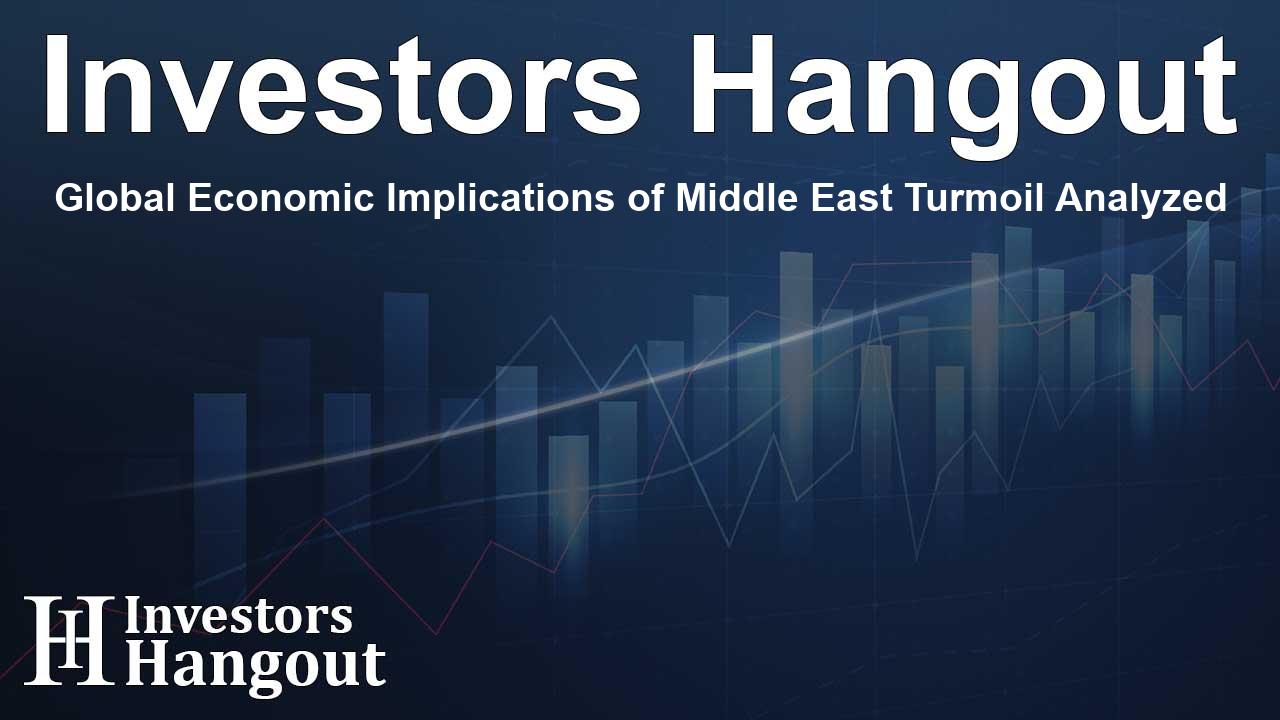Global Economic Implications of Middle East Turmoil Analyzed

Global Economic Implications of Middle East Turmoil
The International Monetary Fund (IMF) has raised alarms regarding the ongoing conflict in the Middle East, emphasizing the potential economic ramifications that could ripple through regional and global economies. With commodity prices remaining below last year's peaks, the situation is being closely watched.
Monitoring the Situation with Concern
IMF spokesperson Julie Kozack articulated significant concerns during a recent press briefing, stating that the organization is observing developments in southern Lebanon with grave concern. She extended condolences for the loss of life amid the escalating conflict.
Risks and Uncertainty Ahead
Kozack cautioned that further escalation of the conflict presents heightened risks and uncertainty not only for the region but for global economic stability as well. While specific global impacts remain unpredictable at this early stage, the socio-economic situation has worsened dramatically, especially in areas like Gaza.
The Dire State of Gaza's Economy
The humanitarian crisis in Gaza has intensified, with insufficient aid deliveries compounding the suffering of civilians. According to the IMF, Gaza's GDP is estimated to have plummeted by 86% in the first half of 2024, reflecting the dire economic situation. In the West Bank, the GDP likely declined by 25%, raising concerns about further deterioration.
Israel’s Economic Downturn
Statistics indicate that Israel has also faced significant economic challenges, with its GDP contracting by approximately 20% in the last quarter of 2023 due to the conflict’s onset. A partial recovery is noted in the first six months of 2024, but the situation remains precarious.
Global Economic Forecasts Amidst Conflict
The IMF plans to release updated economic projections for various countries, including broader assessments of the global economy, later in October during the fall meetings coinciding with the World Bank. This update is eagerly anticipated as uncertainty looms large.
Lebanon: A Fragile Economic Landscape
The intensifying conflict has exacerbated Lebanon’s fragile economic state, where air strikes and military actions have severely impacted the infrastructure. Kozack pointed out the profound human toll and ongoing damage to physical assets in Lebanon, reflecting the broader challenges facing the country.
Commodity Prices and Shipping Concerns
A significant pathway through which the conflict is likely to influence the global economy is via the fluctuation of commodity prices, especially oil and grains. Increased shipping costs have been reported as routes are adjusted to avoid potential missile threats from militant groups in the region.
Ongoing IMF Engagement with Lebanon
In light of these challenges, the IMF highlighted its ongoing engagement with Lebanon, particularly referencing a staff-level agreement from 2022 that aimed to provide a potential loan program. However, progress toward necessary reforms has stalled, and Kozack expressed a readiness to discuss financing programs when conditions are deemed suitable.
Monitoring Uncertainty and Future Actions
Kozack reiterated the IMF's commitment to closely monitor the unfolding situation, indicating that high concern and uncertainty remain paramount. The international community awaits further developments as they may significantly alter the economic landscape in the region and beyond.
Frequently Asked Questions
What is the IMF's current stance on the Middle East conflict?
The IMF is closely monitoring the escalating conflict, concerned about the potential economic ramifications for both the region and globally.
How has the conflict impacted Gaza’s economy?
Gaza's GDP is estimated to have declined by 86% in the first half of 2024, indicating a severe humanitarian crisis alongside economic distress.
What are the economic forecasts for Israel following the conflict?
Israel's GDP contracted about 20% in the fourth quarter of 2023, with only a partial recovery noted in the first half of 2024.
What role do commodity prices play in the economic ramifications?
Higher commodity prices, particularly for oil and grains, as well as increased shipping costs, are potential channels through which the conflict may affect the global economy.
Is the IMF providing support to Lebanon?
Yes, the IMF is currently supporting Lebanon through capacity development assistance and is prepared to discuss financing programs when appropriate reforms can be implemented.
About Investors Hangout
Investors Hangout is a leading online stock forum for financial discussion and learning, offering a wide range of free tools and resources. It draws in traders of all levels, who exchange market knowledge, investigate trading tactics, and keep an eye on industry developments in real time. Featuring financial articles, stock message boards, quotes, charts, company profiles, and live news updates. Through cooperative learning and a wealth of informational resources, it helps users from novices creating their first portfolios to experts honing their techniques. Join Investors Hangout today: https://investorshangout.com/
Disclaimer: The content of this article is solely for general informational purposes only; it does not represent legal, financial, or investment advice. Investors Hangout does not offer financial advice; the author is not a licensed financial advisor. Consult a qualified advisor before making any financial or investment decisions based on this article. The author's interpretation of publicly available data shapes the opinions presented here; as a result, they should not be taken as advice to purchase, sell, or hold any securities mentioned or any other investments. The author does not guarantee the accuracy, completeness, or timeliness of any material, providing it "as is." Information and market conditions may change; past performance is not indicative of future outcomes. If any of the material offered here is inaccurate, please contact us for corrections.